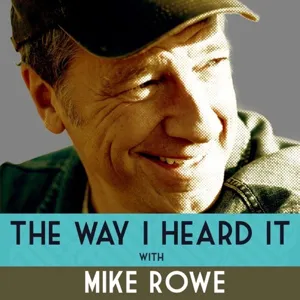The Rather Pathetic Economy of the Roman Empire

Explore "industrial revolution" with insightful episodes like "The Rather Pathetic Economy of the Roman Empire", "A pro-worker work ethic", "Bloomberg Daybreak Holiday Special - New Years Day 2024", "Quizzing Ben Shapiro" and "AI Agents Coming to OpenAI Dev Event?" from podcasts like ""Economics Explained", "The Gray Area with Sean Illing", "Bloomberg Daybreak: Europe Edition", "The Ben Shapiro Show" and "The AI Breakdown: Daily Artificial Intelligence News and Discussions"" and more!



Bloomberg’s Nathan Hager spends the hour covering the biggest tech stories from 2023 and what we can expect for the year ahead. He speaks with Gene Munster of Deepwater Asset Management and Dan Ives from Wedbush.
See omnystudio.com/listener for privacy information.

Is Ben Shapiro smarter than a 5th grader?
Genucel - Exclusive discount for my listeners! https://genucel.com/Ben


It's a bit of a mixed bag today as Jane Mulkerrins sits in for the big interview but Fi is here for the bulk of the podcast! They chat worms of appreciation, banned baby names and Agent V.
Plus, Jeffrey Archer joins Jane and Jane to discuss his new novel 'Traitors Gate'.
If you want to contact the show to ask a question and get involved in the conversation then please email us: janeandfi@times.radio
Follow us on Instagram! @janeandfi
Assistant Producer: Eve Salusbury
Times Radio Producer: Rosie Cutler
Hosted on Acast. See acast.com/privacy for more information.

Megyn Kelly is joined by Doug Brunt, best-selling author of the new book, "The Mysterious Case of Rudolf Diesel," to discuss the mystery at the center of his book, a brief synopsis of who Rudolf Diesel is and his impact on our world today, whether Diesel committed suicide or was murdered, the suspects for who could have mudered Diesel, how authorities identified his body, the devastating impact of his death, his legacy today the difference between writing and selling a fiction vs. non-fiction book, the support and feedback from peers (and Megyn), Meryl Gordon’s book “Mrs. Astor Regrets” and her disappointment with Anderson Cooper for referencing her work throughout his new book, the ethics of citing sources vs. doing your own book research, Doug's life growing up, the different personalities of their kids, where love of books came, and more.
More from Doug Brunt: https://douglasbrunt.com
Follow The Megyn Kelly Show on all social platforms:
YouTube: https://www.youtube.com/MegynKelly
Twitter: http://Twitter.com/MegynKellyShow
Instagram: http://Instagram.com/MegynKellyShow
Facebook: http://Facebook.com/MegynKellyShow
Find out more information at:



In this episode of Stuff to Blow Your Mind, Robert chats with author Fred Hogge about his new book “Of Ice and Men: How We’ve Used Cold to Transform Humanity,” covering everything from cocktail ice to the ancient history of ice houses.
See omnystudio.com/listener for privacy information.

In this episode from October 2019, a16z co-founder Marc Andreessen and former a16z podcast showrunner Sonal Choksi bring on MIT economist and bestselling author Andrew McAfee to discuss why the lessons of human growth in times past, from the Industrial Revolution onwards, might not apply to our future. It used to be that the only way for humanity to grow — and progress — was through destroying the environment. But is this interplay between human growth vs. environment really a zero-sum game? Even if it were true in history, is it true today? If capitalism is not responsible for environmental degradation, than who or what is? And where does (and doesn’t) technology come in?
The conversation is based on McAfee’s 2019 book More from Less: The Surprising Story of How We Learned to Prosper Using Fewer Resources -- and What Happens Next, ranging broadly across many areas of growth, from the future of energy and agriculture to the role of capitalism and technology today and tomorrow, from dematerialization to Tesla, Buckminster Fuller, and more.

Could an explosion in tea-drinking explain a decline in deaths in England during the industrial revolution? Professor Francisca Antman, an economist at the University of Colorado Boulder believes it might.
Tim Harford discovers that dusting down the data from tea shipments and local burial records gives us surprising insight into how boiling water for tea accidentally improved public health.
Presenter: Tim Harford Producer: Nathan Gower Sound Engineer: Graham Puddifoot




Pseudoscience often enters our world where magic fails us, seeming to make the impossible possible via the invocation of actual scientific and technological marvels. In this episode of Stuff to Blow Your Mind, Robert and Christian explore the unmistakably necromantic world of optography, a 19th century notion that the last images seen by the dead might be retrieved from the flesh and fluid of the eye.
Learn more about your ad-choices at https://www.iheartpodcastnetwork.com
See omnystudio.com/listener for privacy information.

Researchers are trying to figure out who gets bored - and why - and what it means for ourselves and the economy. But maybe there's an upside to boredom?

With 3D printing you can print not just pictures and words, but actual objects from files. And as costs come down, the list of things you can print expand: from food, to organs, to guns.
Learn more about your ad-choices at https://www.iheartpodcastnetwork.com
See omnystudio.com/listener for privacy information.

Sure 3D printers are cool, but where will they ultimately take us? In this episode of Stuff to Blow Your Mind, Robert and Julie discuss some of the amazing things happening in 3D printing, what the future will bring and whether it will destroy us all.
Learn more about your ad-choices at https://www.iheartpodcastnetwork.com
See omnystudio.com/listener for privacy information.
Stay up to date
For any inquiries, please email us at hello@podcastworld.io